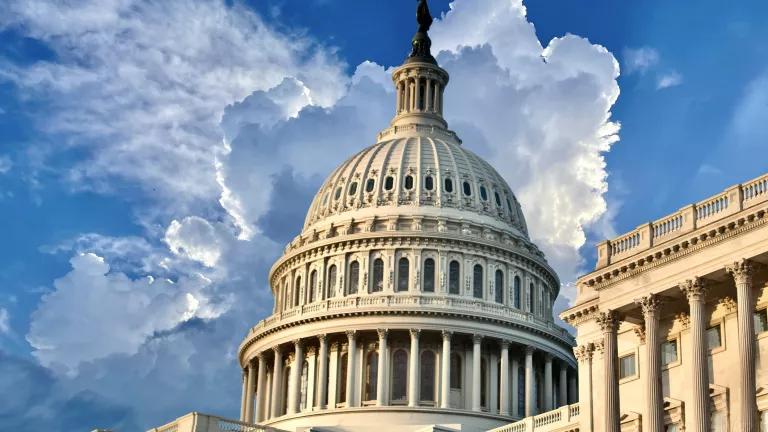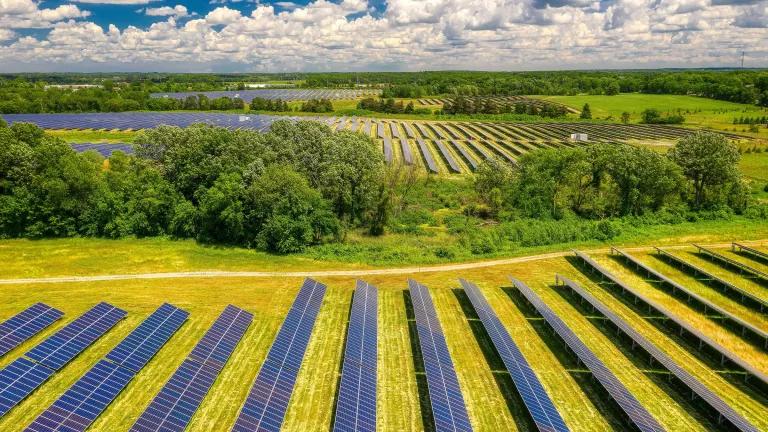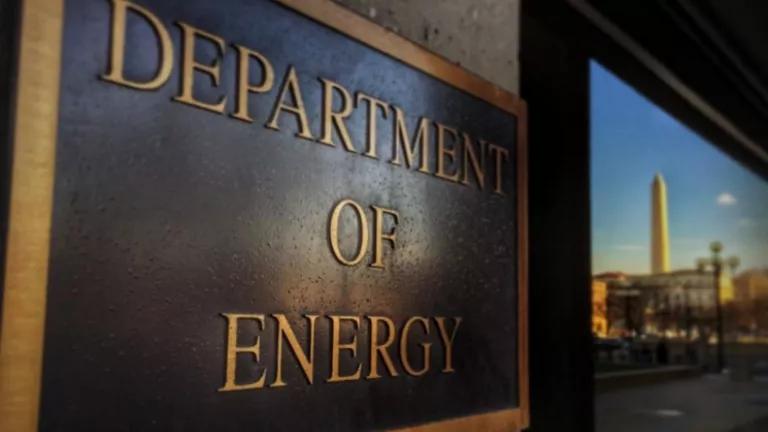The Senate Must Defend the Success of DOE Clean Energy Programs
The House’s Energy and Water bill contains harmful provisions for U.S. households, U.S. competitiveness in the global clean energy race, and our climate fight.

United States Capitol
istock/Douglas Rissing
Last month, the House Appropriations Committee advanced their fiscal 2024 Energy-Water (E&W) spending bill on a party-line vote. Unfortunately, it includes harmful provisions for U.S. households, U.S. competitiveness in the global clean energy race, and our climate fight.
Among the many disappointing funding cuts in the bill to dismantle climate and clean energy progress at the Department of Energy (DOE), it is particularly frustrating to see the cancellation of pivotal Inflation Reduction Act (IRA) building sector funding, the revocation of $15 billion in loan authority made available to the DOE Loan Program Office (LPO), and budget reductions of 14 percent (compared to FY 2023) at DOE’s Office of Energy Efficiency and Renewable Energy (EERE) – with a significant 23 percent cut to the Building Technologies Office (BTO).
Supporters of the House committee-passed E&W bill argue the measure will reduce spending on programs they view as unnecessary while reprioritizing funding to areas that strengthen our nation’s energy security to reduce our reliance on China. Unfortunately, the House E&W bill does the opposite. The measure eliminates vital funding from climate change initiatives to maintain fossil combustion-centric programs and directs DOE to support research, development, and demonstration activities that include all fossil resources, including coal.
The proposed cuts impact our nation’s ability to secure our energy future, impede households’ and businesses’ energy cost-savings, undermine job creation, and hinder our country’s competitiveness in the global clean energy innovation race. During tomorrow’s Senate E&W markup, appropriators must reject the inclusion of similar House policies that ignore the need to uphold the Federal Government’s role in increasing energy accessibility and affordability for U.S. households and businesses, enhancing U.S. leadership on clean energy innovation, and addressing the dangers of climate change.
The bill will rob U.S. households and businesses of lower energy bills and pull our buildings further off the decarbonization course.
If enacted, the House committee’s drastic cuts to BTO’s budget will forgo energy bill savings for communities and businesses and put U.S. buildings further off the decarbonization path. The building sector is one of the most carbon-intensive sectors of the U.S. economy, responsible for nearly 40 percent of domestic greenhouse gas emissions, and there is an increasing urgency to center our built environment within the nation’s climate action plan. Without targeted provisions to incentivize clean energy adoption in the built environment, the nation’s building sector will fall far short of net-zero emissions by 2050.
Moreover, the House bill rescinds pro-consumer IRA provisions, including $4.5 billion for rebates for new electric appliances or the installation of home electrification projects, $1 billion for states and local governments to adopt and achieve compliance with the latest building energy codes, and $200 million for installation training for home energy efficiency and electrification projects. These rescissions from the IRA will rob people — particularly middle- and lower-income families — of lower energy bills, jobs, and paths to healthier, more equitable buildings.
The bill further diminishes DOE’s rule-making authority by adopting amendments to prevent the Department from creating new efficiency standards on gas stoves and washing machines. Many will view these measures as simply messaging provisions. Still, behind the veil, if the Senate includes similar language and the provisions are enacted, they will weaken DOE’s highly successful energy efficiency standards program. The program saves the average family $500 annually while also benefiting the environment. For instance, the gas stove provision will prevent DOE from implementing modest energy efficiency requirements for new gas and electric stoves. According to DOE’s analysis, these standards would save consumers $1.7 billion and avoid 22 million metric tons of CO2 over 30 years. About 50% of models comply with the standards today, including all entry-level models.
The bill compromises EERE’s substantial economic benefits and U.S. leadership in the global clean energy innovation race.
The adopted reductions by the Committee will also diminish the substantial economic benefits to the U.S. that EERE investments have delivered to date. As the single-largest investor in clean energy technology development in the Federal Government, EERE has the essential role of developing sectors that will secure our nation’s energy future.
EERE helps sustain American leadership in transitioning to the global clean energy economy, boosts job creation, advances energy security, and ensures that the clean energy economy benefits all communities. Coupled with the rescission of $15 billion in loan guarantee authority from the Title 17 Innovative Technology Loan Guarantee Program, the bill, if enacted, will hinder our efforts to build new industries around clean energy technologies s at a time when doing so is essential for our global competitiveness and supply chain security.
The House bill imperils U.S. energy security and global standing on clean energy innovation. The Senate must do better.
It is disappointing that at a time when the Intergovernmental Panel on Climate Change has once again forewarned of the need for accelerated decarbonization measures before climate catastrophe becomes inevitable—and when the geopolitical tensions and energy crisis triggered by the Russian invasion of Ukraine have laid bare the risks of our fossil fuel dependence—that the House E&W bill aims to impede the cultivation and commercialization of the clean energy technologies that will aid in deploying solutions to address climate change.
The House committee’s adopted cuts meaningfully jeopardize this urgent mission and fail to acknowledge that by focusing on climate, we can improve the health of communities, lower energy costs for families, keep our world safer, make our economies more stable, and grow jobs.
As we look toward 2050, our efforts now to achieve a net-zero economy will be essential to safety, Americans’ well-being, and our place in the global landscape. The need for robust funding for several DOE programs remains, so as the Senate E&W markup approaches, it is a necessity that Senate appropriators protect measures to advance the clean energy transition. Therefore, the Senate must resoundingly reject the following:
- Funding cuts to the Department of Energy’s Energy Efficiency and Renewable Energy program;
- Rescissions from the Department of Energy’s Inflation Reduction Act programs, including:
- the High-Efficiency Electric Home Rebate Program,
- the Assistance for Zero Building Energy Code Adoption, and
- the State-Based Home Energy Efficiency Contractor Training Grants;
- Recession of loan authority from the Department of Energy’s Title 17 Innovative Technology Loan Guarantee Program;
- Provisions that shrink funding for environmental cleanup activities;
- Provisions that hinder and weaken the Department of Energy’s energy efficiency program; and
- Inclusion of language that prohibits funding for advancing racial equity and support for underserved communities through the Federal Government.
We look forward to a better bill from the Senate and the resounding rejection of the House’s misguided E&W measure.



